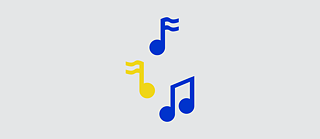Word! The Language Column
Singing along without knowing the words

What are they actually singing about? Thomas Böhm admits that he doesn’t always get the words to pop songs. When looks them up on the Internet, he’s sometimes unpleasantly surprised. But sometimes he’s delighted to discover the poetry of pop songs.
Ever since I started listening closely to pop songs, I’ve had a hard time getting the words. I remember dancing in the kitchen to The Lovecats by The Cure when I was thirteen – or at least trying to. If you’re familiar with the song’s tricky rhythm, you’ll know what I mean. I had no idea what the song was about. About cats, of course, about “missing” and “kissing” you, in other words about love and longing, but I didn't want to know a whole lot more than that at the time. To this day I still don't know the exact lyrics and what they mean, and I still resist the temptation to look them up on the web.
I would certainly have kept this lifelong ignorance to myself had I not recently read Blackbird, a novel by Matthias Brandt, one of the best and most famous German actors these days – and, by the way, a son of Willy Brandt, who was chancellor from 1969 to 1974. The novel’s title is from the eponymous Beatles song. Matthias Brandt recalls in an interview that, as a young man, he didn’t really get the lyrics. He didn’t know that the blackbird in Paul McCartney's lyrics symbolizes an American woman “of colour” subjected to everyday discrimination.
Listen closely
Now, Matthias Brandt and I are part of a generation that grew up before globalization – in an age in which mastering a foreign language was “cool” or proof of being cultivated, but not yet a must. And we could always blame our bad schoolteachers for failing to kindle our enthusiasm for foreign languages.Recently, on the other hand, I was struck by the vast repertoire of songs that my two daughters (ten and fourteen years old), to whom I already owe many an insight into language, can sing – or even rap – along to. And (or so it seemed to me) without any of the usual mondegreens, i.e. misheard phrases à la “The ants are my friends, they're blowin' in the wind!” instead of “The answer, my friends, is blowin' in the wind”, to (mis)quote the Nobel Prize-winning folk singer Bob Dylan.
For example, my daughters give such a letter-perfect rendition of a song with the innocuous title “Rockstar” by American singer-songwriter Post Malone that I looked up the lines on the web. And all of a sudden I aged a hundred years and wanted to avail myself of the harshest pedagogy to forbid kids to listen to this brand of misanthropic, misogynistic music on pain of penalties. But I thought better of it and sought to enlighten them by reasoning with them instead. So I merely asked, “Do you actually understand what you’re singing there?”
Subtext
When I ask myself this question, it suddenly takes on momentous proportions. Isn't the language I speak like a song I sing along to my whole life long without even knowing the words? Without giving any thought to what lies behind some of the words we use so unthinkingly? So other people have to come up to me and point out, “Do you actually understand the connotations when you use the words ‘black’ or ‘coloured’ or ‘race’?” Then I have a choice: Do I feel like a teenager who needs to be lectured to? And who can then insist on his blamelessness and argue in his defence that everyone else does it too. So what's wrong with using those words? Or I can think it over ...Yesterday I looked up the lyrics to two songs I’m really into these days. I was very surprised to see how much I hadn’t understood. How much poetry, how much mystery, how many words I didn’t know. So I looked them all up. And I’ve got to say: I like singing along even more now.
Word! The Language Column
Our column “Word!” appears every two weeks. It is dedicated to language – as a cultural and social phenomenon. How does language develop, what attitude do authors have towards “their” language, how does language shape a society? ~ Changing columnists – people with a professional or other connection to language – follow their personal topics for six consecutive issues.